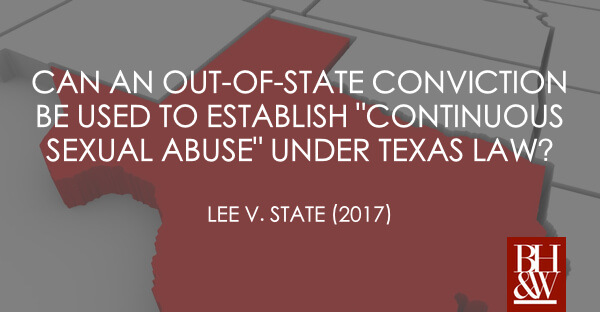
Texas Court of Criminal Appeals Holds That An Out-of-State Conviction Cannot Be Used to Establish “Continuous Sexual Abuse” Under Texas Law
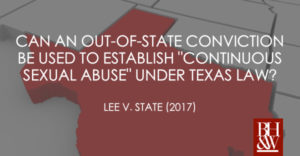 The Court of Criminal Appeals recently handed down an opinion regarding the use of an out-of-state act to support a conviction in Texas. The issue faced by the Court was whether the commission of an out-of-state aggravated sexual assault could support a conviction for continuous sexual abuse of a child under Texas law.
The Court of Criminal Appeals recently handed down an opinion regarding the use of an out-of-state act to support a conviction in Texas. The issue faced by the Court was whether the commission of an out-of-state aggravated sexual assault could support a conviction for continuous sexual abuse of a child under Texas law.
Lee v. State (Tex. Ct. Crim. App. 2017)
The Facts—The Trial Court Found Defendant Guilty of Continuous Sexual Abuse of a Child
In this case, Ronald Lee (Defendant) was convicted of continuous sexual assault of a child and the jury assessed a life sentence. During trial, evidence showed that Defendant committed aggravated sexual assault against his young stepdaughter twice, once in New Jersey and once in Texas. Both assaults were temporally separated by at least 30 days.
Texas Penal Code Section 21.02 prohibits the commission of two or more acts of sexual abuse over a specified time. Although committed in two separate states, the trial court permitted the evidence of both sexual assaults in New Jersey and Texas in order to convict Defendant.
The Court of Appeals Affirmed the Conviction, Holding that the Evidence was Legally Sufficient to Support the Conviction
On appeal, Defendant claimed that the evidence presented—the alleged act in New Jersey—was insufficient to support his conviction in Texas. The court of appeals held that because Defendant was charged and convicted under Texas Penal Code Section 21.01 for continuous sexual abuse, Texas has jurisdiction if part of the prohibited conduct element occurred in Texas. Further, the court determined that the location of the sexual abuse was not an element of the offense; thus, the State’s only obligation was to prove that the court of prosecution had venue—proper jurisdiction. As a result, because one of the alleged acts of sexual abuse occurred in Taylor County, the court of appeals said that the evidence was sufficient to prove venue.
The Court of Criminal Appeals Reforms the Judgment to a Lesser-Included Offense Conviction, Holding the Evidence was Legally Insufficient to Support the Original Conviction
Defendant appealed the appellate court’s decision to affirm his conviction. He argued that the alleged act of abuse in New Jersey was not sufficient proof required under the Texas Penal Code, which requires two or more violations of penal code sections. Each of these required offenses must be a violation of Texas law. Texas only has jurisdiction over an offense if either an action element or result element of the offense occurs inside the state. Because “act of sexual abuse” requires an act that is a violation of Texas law, Defendant’s act in New Jersey may not be considered one of the required offenses for a conviction under Section 21.02. The Court of Criminal Appeals determined that Texas had jurisdiction of continuous sexual abuse of a child, but the evidence in this case was insufficient to support the conviction because one of the acts was not a violation of Texas law.
When an appellate court finds that the evidence was insufficient to support a charged offense, but the jury found the defendant guilty of a lesser offense supported by sufficient evidence, then the appellate court must reform the judgment to reflect the lesser-included offense and remand for new punishment. In this case, the Court of Criminal Appeals concluded that the jury found Defendant guilty of aggravated sexual assault, which was the lesser-included offense, and remanded the case for a punishment hearing.

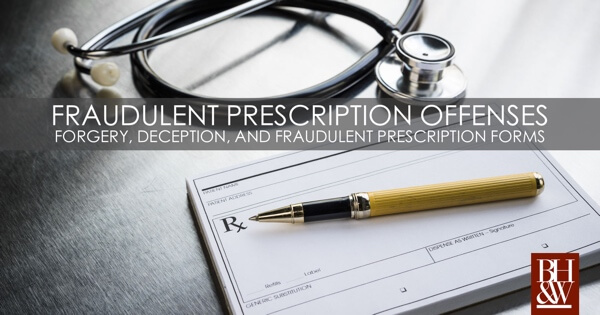
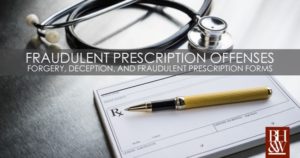 In 2012, the Texas Court of Criminal Appeals released an opinion concerning whether a defendant may be convicted under Texas Health and Safety Code Section 481.129(a)(5)(B) for using a “fraudulent prescription form” when the facts showed that the defendant altered the dosage information on an otherwise valid prescription that had been written by the defendant’s physician.
In 2012, the Texas Court of Criminal Appeals released an opinion concerning whether a defendant may be convicted under Texas Health and Safety Code Section 481.129(a)(5)(B) for using a “fraudulent prescription form” when the facts showed that the defendant altered the dosage information on an otherwise valid prescription that had been written by the defendant’s physician.
 The Court of Criminal Appeals recently handed down a case regarding a police officer’s findings of reasonable suspicion and probable cause. The issue was whether an officer had probable cause to arrest a customer for theft from a store before she actually exited the store and when she claimed, after being confronted by the officer, that she was going to pay for the items shad had placed in her purse.
The Court of Criminal Appeals recently handed down a case regarding a police officer’s findings of reasonable suspicion and probable cause. The issue was whether an officer had probable cause to arrest a customer for theft from a store before she actually exited the store and when she claimed, after being confronted by the officer, that she was going to pay for the items shad had placed in her purse.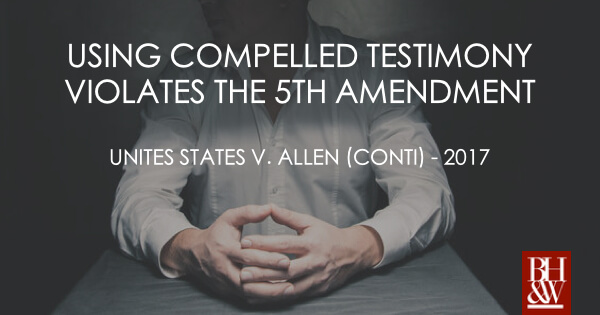
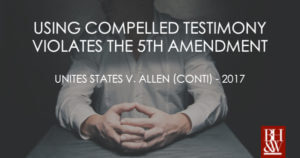 The Second Circuit Court of Appeals recently handed down an opinion concerning the use of compelled testimony in an American trial. In Allen and Conti, the Court was asked to determine whether previous compelled testimony by a foreign government, which was later used against the defendant in a criminal prosecution in the United States, violated the Fifth Amendment.
The Second Circuit Court of Appeals recently handed down an opinion concerning the use of compelled testimony in an American trial. In Allen and Conti, the Court was asked to determine whether previous compelled testimony by a foreign government, which was later used against the defendant in a criminal prosecution in the United States, violated the Fifth Amendment.





